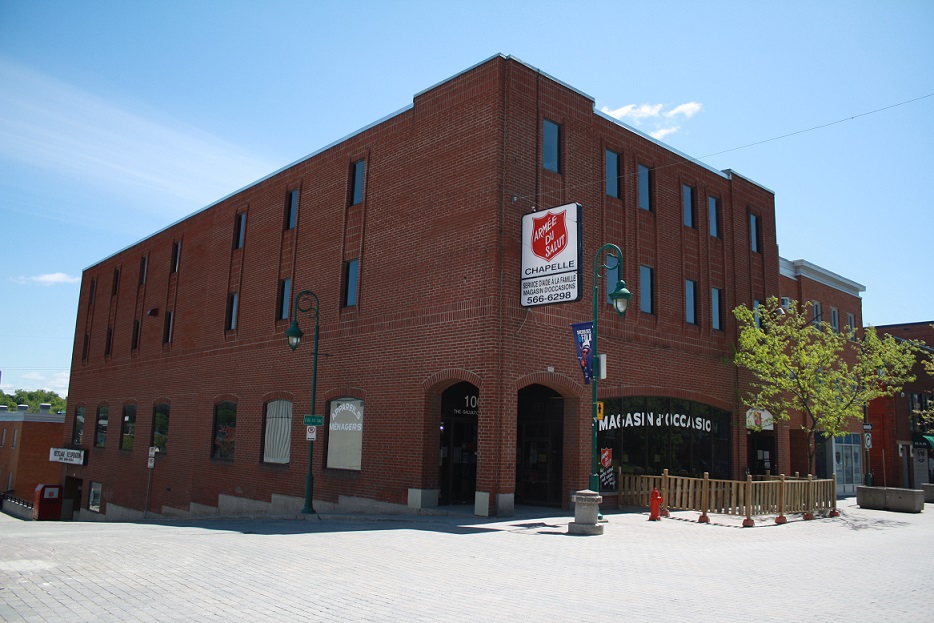The church behind the counter: understanding The Salvation Army

When people think of what makes something a church, there is a set list of criteria that tend to come to mind. Whether it is pews and stained glass or hymns and Bibles, people tend to have a pretty clear and specific vision in mind when deciding whether or not a gathering of people constitutes a church.
It is for that reason that a lot of people don’t realize that the Salvation Army is not just a religious organization, but a full-on christian church. Who could blame them, really? The average exposure a person gets to the Salvation Army is in the form of a thrift store, and while things like rummage sales might be on some “what-makes-a-church”lists, it’s likely that the sales are an occasional thing and not the year-round storefront that people know the “Sally Ann” to be. So where’s the link between the second hand store and the church?
According to Captain Claude Dagenais, the corps officer at the head of the SherbrookeSalvation Army branch, the connection lies in the church’s dedication to the idea of work.
“Money is not our master, it is our servant,” Dagenais said, explaining that theSalvation Army holds service for the community, by the community at its very core. The captain presented the spirituality of the church as a simple one concentrated not on gathering membership but on preaching the Christian gospels in a simple and straightforward way for those who they see as needing it the most.
“It takes wisdom to walk by a person panhandling in the streets, maybe drunk, and see
him as a man that God loves,” Dagenais said, “But the reality is that Christ died for this guy.”
Though the church is unconventional as compared to other long-established denominations, with its military-styled structure and service-first approach, theSalvation Army is hardly a newcomer in the world of local Christian communities. The church found its beginnings on the streets of Victorian England in 1865 when its founders walked away from conventional churches in order to serve the poor, homeless, and destitute.
Perhaps not surprisingly, based on the name, the Salvation Army focuses its work on the practice of saving people’s souls. They believe quite distinctly in heaven for the righteous, and hell for the sinner but, Dagenais clarified, the church is not about forcing people to walk any particular path.
“People know they need to change their ways,” the captain said. “We’re just here to listen and to serve.”
Dagenais called the Salvation Army servants of the community, explaining that the officers of the church hierarchy commit themselves fully to the work of serving the poorand the destitute. Though there are many ranks within the church, leading from a basic Lieutenant right up to the elected General of the entire international church, the captain shared that the rankings only denote experience and responsibility, and not pay.
Though people associate the Salvation army with its commercial operations a lot of the time, the Sherbrooke leader said that he probably gets a larger allocation of pay from the church than the international General right now because he has a family with children under 18. The whole point, he explained, is to ensure that community leaders have the need of their families covered so that they can commit the time and energy they have more fully to their community.
The church in Sherbrooke meets on Sundays T at 10:30 a.m. but Dagenais emphasized that most of the community’s work takes place outside of the 30-40 minutes of gathering each week. Many people gather for what he called B.C.M. before the Sunday service; Bible, coffee, and muffin, that is; and still others gather for the weekly lunch that takes place afterward.
”Salvation Army and food just go together,” Dagenais said, expressing that the whole experience is built around making connections with individuals who often have nowhere else to turn and have built massive walls of dependency and mistrust around ultimately fragile selves.
Though the captain now speaks from the position of local community leader, he explained that he started out his journey on the other side of the service counter. Though more than two decades have passed since Dagenais found the Salvation Army, he explained that it sometimes does not feel like so long ago that he was a drug addict living on the streets.
“All I needed was to know what it felt like to be loved,” Dagenais said, adding that he has now been with the church long enough to see others come into the store to do community service only to gradually rise to the point of having distinct and significant responsibilities within the church community. “These are people living day to day with the whole weight of society on their backs.”
Dagenais boiled the work of the Salvation Army down to one simple formula “I loveGod; God loves the poor,” the Captain said. “You do the math.”
As simple as that concept might be, however, working with the poor in any community is not without its challenges. Dagenais said that because of its approach to service, theSalvation Army is a poor church that is very reliant on the support of the broader community.
“We couldn’t do this without community support,” the captain said adding that a number of churches in the region provide key support at holiday times. Though the community leader said that the church has a large number of material concerns, he also said that the church believes that when God is needed, God will appear, meaning that in situations of great need an answer presents itself.
Shifting his thinking to the matter of spiritual challenges the church faces, Dagenais said that the ever-present struggle is the walk towards “holiness” and the push to keep people out of their comfort zones in serving the community.
“Nothing happens in your comfort zone,” Dagenais said with a smile, pointing out that there is always a need to be served.
